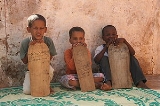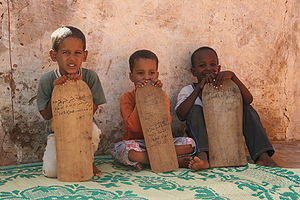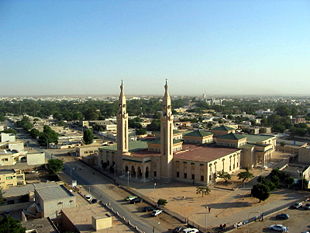
Islam in Mauritania
Encyclopedia


Virtually all Mauritania
Mauritania
Mauritania is a country in the Maghreb and West Africa. It is bordered by the Atlantic Ocean in the west, by Western Sahara in the north, by Algeria in the northeast, by Mali in the east and southeast, and by Senegal in the southwest...
ns are Sunni Muslims. They adhere to the Maliki
Maliki
The ' madhhab is one of the schools of Fiqh or religious law within Sunni Islam. It is the second-largest of the four schools, followed by approximately 25% of Muslims, mostly in North Africa, West Africa, the United Arab Emirates, Kuwait, and in some parts of Saudi Arabia...
madhab, one of the four Sunni schools of law. Since independence in 1960, Mauritania has been an Islam
Islam
Islam . The most common are and . : Arabic pronunciation varies regionally. The first vowel ranges from ~~. The second vowel ranges from ~~~...
ic republic. The Constitutional Charter of 1985 declares Islam the state religion and sharia
Sharia
Sharia law, is the moral code and religious law of Islam. Sharia is derived from two primary sources of Islamic law: the precepts set forth in the Quran, and the example set by the Islamic prophet Muhammad in the Sunnah. Fiqh jurisprudence interprets and extends the application of sharia to...
the law of the land.
History
Islam first spread southward into West AfricaWest Africa
West Africa or Western Africa is the westernmost region of the African continent. Geopolitically, the UN definition of Western Africa includes the following 16 countries and an area of approximately 5 million square km:-Flags of West Africa:...
, including Mauritania, with the movement of Muslim traders and craftsmen and later with the founders of Islamic brotherhoods. Although the brotherhoods (Sufism
Sufism
Sufism or ' is defined by its adherents as the inner, mystical dimension of Islam. A practitioner of this tradition is generally known as a '...
and tariqa) played a role in the early expansion of Islam, it was not until the nineteenth century that these religious orders assumed importance when they attempted to make religion a force for expanding identities and loyalties beyond the limits of kinship. The relative peace brought to the area by French administration and the growing resentment of colonial rule contributed to the rapid rise in the power and influence of the brotherhoods. In recent decades, these orders have opposed tribalism and have been an indispensable element in the growth of nationalist sentiment.
Sufi brotherhoods
In the 1980s, two brotherhoods (tariqa), the Qadiriyyah and the TijaniyyahTijaniyyah
The Tijāniyyah is a sufi tariqa originating in North Africa but now more widespread in West Africa, particularly in Senegal, The Gambia, Mauritania, Mali, Guinea, and Northern Nigeria and Sudan...
, accounted for nearly all the brotherhood membership in Mauritania. The Qadiriyyah and Tijaniyyah were essentially parallel "ways," differing primarily in their methods of reciting the litanies. Their Islamic doctrines and their religious obligations were basically similar. Two smaller brotherhoods also existed-- the Shadhiliyyah, centered in Boumdeït in Tagant
Tagant
Tagant is a region in south-central Mauritania named for the Tagant Plateau. Its capital is Tidjikdja. Other major cities/towns include Tichit and Rachid, Nbeika...
Region, and the Goudfiya, found in the regions of Tagant, Adrar, Hodh ech Chargui
Hodh Ech Chargui
Hodh Ech Chargui is a large region in eastern Mauritania. Its capital is Néma. Other major cities/towns include Oualata. The region borders the Mauritanian regions of Adrar, Tagant and Hodh El Gharbi to the west and Mali to the east and south....
, and Hodh el Gharbi
Hodh El Gharbi
Hodh El Gharbi is a region in southern Mauritania. Its capital is Ayoun el Atrous. The region borders the Mauritanian regions of Tagant to the north, Hodh Ech Chargui to the east, Mali country to the south and Assaba to the west....
.

